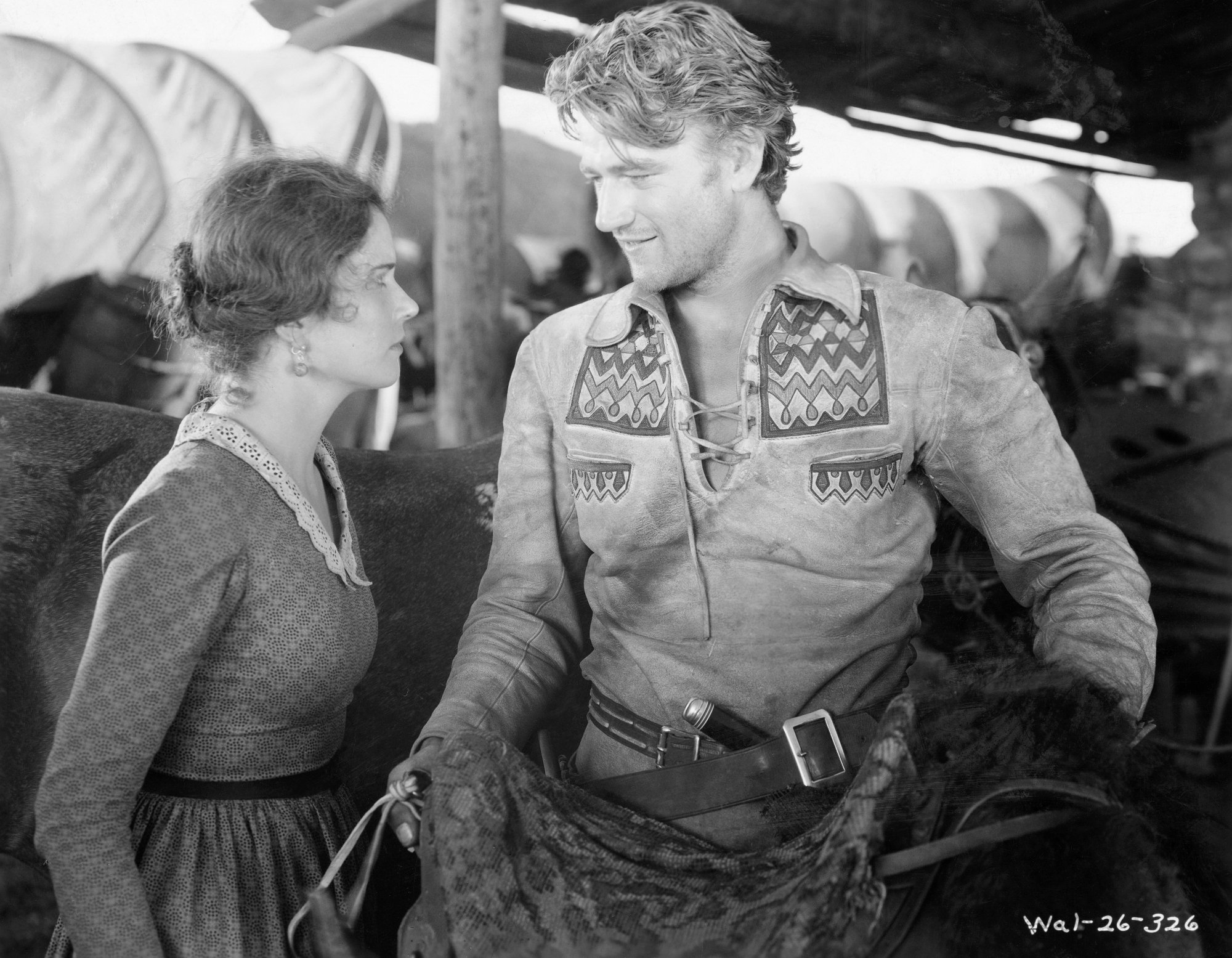12 John Wayne Movies With a 100% Tomatometer Score on Rotten Tomatoes
John Wayne has over 180 acting credits to his name. However, critics didn’t rave about many of his performances, often saying that he only plays himself. That isn’t to say that the same group didn’t praise any of the legendary actor’s movies. There are 12 Wayne movies that earned the coveted 100% Tomatometer score on Rotten Tomatoes, but they aren’t all the titles that one would expect: his only Oscar-winning role in True Grit isn’t on the list.
‘The Big Trail’ (1930)

The Big Trail follows an upstart fur trapper named Breck Coleman (Wayne). He strikes an agreement to lead and protect a group of pioneers along the Oregon Trail. However, they face many dangers, such as a raid, a blizzard, and the scorching desert. Breck tries to begin a romance with a woman named Ruth Cameron (Marguerite Churchill). Meanwhile, he seeks revenge on the men who killed his mentor.
The first of Wayne’s movies to put him in the lead role is The Big Trail. However, the film failed at the box office. As a result, Wayne had difficulty returning to the leading role at the movies. He would ultimately get there, but it took some time.
Critics look back at The Big Trail for its historical value, calling it a “must for Wayne fans.”
‘Baby Face’ (1933)
Baby Face tells the story of Lily Powers (Barbara Stanwyck) and her sexual escapades. She’s the daughter of a speakeasy owner who lives a somber life in Pennsylvania. However, her whole life is turned upside down when her father dies in an accident. She joins her friend, Chico (Theresa Harris), on a freight train and heads to New York City to seduce powerful men to make her way to the top.
Wayne plays a supporting role in Baby Face as Jimmy McCoy Jr., one of Lily’s lovers.
Critics praise the movie for its ability to touch on the dark subject matter and the timeliness quality that allows it to still play well in modern-day.
‘Stagecoach’ (1939)
John Ford’s Stagecoach follows a group of passengers on the Overland stagecoach heading toward Lordsburg, New Mexico in the 1880s. The characters include a philosophizer (Thomas Mitchell), a lady with a poor reputation (Claire Trevor), and a liquor salesman (Donald Meek). However, they must deal with an escaped outlaw named the Ringo Kid (Wayne) and other threats along the Wild West.
It’s worth noting that Stagecoach is Wayne’s only movie with a “certified” rating, meaning that it meets a higher review input on the platform. Critics called Stagecoach “the best that the Western genre has to offer” and refer to Wayne’s “mesmerizing star turn.”
‘Dark Command’ (1940)
Dark Command takes place at the turn of the Civil War. It follows the townsfolk of Lawrence, Kansas as they are caught in the crossfire between the North and the South. Mary McCloud (Claire Trevor) marries a seemingly peaceful man (Walter Pidgeon) but doesn’t realize that he has a dark secret. He’s part of a gang that steals from and terrorizes those who support the North.
Wayne plays Mary’s former lover, Bob Seton. He’s a Union supporter who Mary’s husband plans to execute.
Critics on Rotten Tomatoes note that the film was a huge box office hit, calling it an “unusual Western.” The reviews commend director Raoul Walsh’s developed action.
‘The Long Voyage Home’ (1940)
The Long Voyage picks up in the early days of World War II. An English cargo crew includes Swede (Wayne), Smitty (Ian Hunter), Yank (Ward Bond), and Driscoll (Thomas Mitchell), who are traveling from the West Indies to Baltimore. However, they realize that their new cargo is dynamite, making them uncomfortable. They begin to question if there’s a Nazi spy on board.
The critical reception is very positive, recognizing the Wayne movie for its “haunting” ability to depict life at sea.
‘The Fighting Seabees’ (1944)
The Fighting Seabees follows Wedge Donovan (Wayne), who is the civilian head of a construction company. However, everything changes when he’s asked to train Navy men as specialists. Wedge wants to show that his own crew is able to get the job done, but Japanese soldiers prove him dead wrong.
Rotten Tomatoes critics explained that this is one of Wayne’s very best World War II movies, celebrating the actor’s impact in the film.
‘Fort Apache’ (1948)
Fort Apache tells the story of a stubborn Civil War hero named Colonel Owen Thursday (Henry Fonda). He heads to Arizona with his daughter, Philadelphia (Shirley Temple), to assume his position as the head of the Fort Apache outpost. However, he butts heads with the calm Captain Kirby York (Wayne), who tries to warn Thursday against battling with local Native Americans.
Fort Apache got positive reviews thanks to a tremendous cast, including Wayne, and the film’s social commentary.
‘Red River’ (1948)
Red River follows Thomas Dunson (Wayne) after he starts a Texas cattle ranch. He has the help of his trail hand named Groot (Walter Brennan), his protégé, Matt (Montgomery Clift), and an orphan. However, Thomas must travel on a cattle drive to Missouri for better prices after the economic impact of the Civil War. The journey weighs on Thomas and Matt, as they begin to turn on one another.
Critics continue to celebrate the complexity of the character, Thomas, which is a rare compliment given to Wayne movies. Rotten Tomatoes critics crown Red River for its ability to escalate the typical Western movie.
‘Sands of Iwo Jima’ (1949)
Sands of Iwo Jima follows the despised Marine Sgt. John Stryker (Wayne), who puts his men through exhausting training. However, the rough nature of the war in the Pacific begins to transform their negative opinion of Stryker into respect. They’ll need all of the training that they got in order to fight to survive the Battle of Iwo Jima.
The reviews for Sands of Iwo Jima note that it’s one of the movies “tailor-made” for Wayne. They call out its status as a piece of propaganda but celebrate that it highlights one of the actor’s best roles.
‘The Comancheros’ (1961)
The Comancheros tells the story of an aging Texas ranger named Jake Cutter (Wayne) after his partner is killed. He’s assigned to apprehend a gambler (Stuart Whitman), who is a prisoner who escaped his execution. However, Jake encounters the Comancheros, a gang of outlaws providing guns and booze to the Comanches. As a result of working with the gambler, Jake begins to question his assignment.
The Rotten Tomatoes reviews rave about the Wayne movie’s charm and lively nature. They criticize its predictability but note how it always remains entertaining.
‘The Sons of Katie Elder’ (1965)
The Sons of Katie Elder explores four sons as they reunite in their Texas hometown for their mother’s funeral. Gunfighter John (Wayne) and Tom (Dean Martin) are the oldest brothers, who discover that their father gambled away their family ranch, resulting in his murder. The brothers plan to avenge his death and win back their family ranch.
Out of all the Wayne movies, some critics explain how they have a soft spot for The Sons of Katie Elder. It isn’t necessarily demanding of its audience, but it’s an exciting Western with a great cast.
‘El Dorado’ (1967)
El Dorado picks up as a heartless tycoon named Bart Jason (Edward Asner) hires a group of bandits to force the MacDonald family out of El Dorado to claim their land. The town sheriff is too busy with his own woes to help the family. However, a noble elder gunfighter named Cole Thorton (Wayne) learns about what’s happening and decides to help. He heads to El Dorado with his friend, Mississippi (James Caan), to stand up for what’s right.
The reviews tip their hat at El Dorado as one of Wayne’s most entertaining movies. It’s called “funny,” “moving,” and “vivid” storytelling that keeps its audiences entertained for the duration of its runtime.


